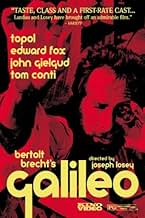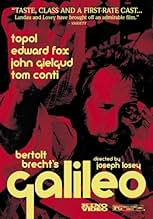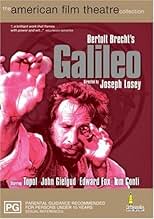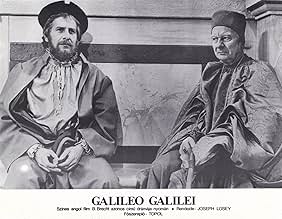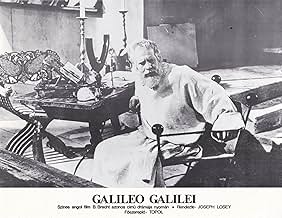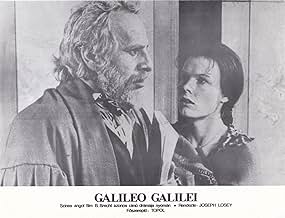Galileo Galilei, sus descubrimientos telescópicos, el apoyo a la teoría copernicana, el conflicto con la Iglesia Católica que llevó al encarcelamiento y su influencia en futuros científicos ... Leer todoGalileo Galilei, sus descubrimientos telescópicos, el apoyo a la teoría copernicana, el conflicto con la Iglesia Católica que llevó al encarcelamiento y su influencia en futuros científicos como Newton y Kepler.Galileo Galilei, sus descubrimientos telescópicos, el apoyo a la teoría copernicana, el conflicto con la Iglesia Católica que llevó al encarcelamiento y su influencia en futuros científicos como Newton y Kepler.
- Dirección
- Guionistas
- Elenco
Opiniones destacadas
An exception cast has been pulled together to tell the story and it is an absorbing tale, essentially delivered as a play with no exterior shots to be seen. The cast are universally good, although, I was never entirely convinced by Topol in the lead.
This is like a play or at least a staged film. There are those three singing boys introducing each section. After all, it is based on a play. The story unfolds episodically in nature. Some of this may be educational. The general story is familiar to me. This British film is filled with solid actors, but the tension isn't very high.
Topol with his impatient manner of speech is somewhat insufferable as Galileo. But then, by all accounts, the real Galileo had a touch of arrogance in him and was not very likeable. This movie does not capture the horrors of pre-Industrial Europe, when religious authorities could inflict the most fiendish tortures on any victims they chose. This movie could have made a statement about religion run amok in the social milieu of the day. Instead, it is a bland film lacking dramatic tension. It is a movie adapted from a play and it shows. There is even a chorus of choirboys which is totally out of place. However, there are few bio-pics of great scientists, so this one is worth watching once.
¿Sabías que…?
- TriviaJoseph Losey had also directed the original Broadway production of "Galileo," 28 years previously.
- ErroresAfter the crier announces Galileo Galilei's recantation, a chessboard is seen on the left side of the screen: all the pieces are upright. As Galileo enters, a new shot shows that one of the pieces has been toppled. In the next shot, all the pieces are again upright (1:57:50-1:58:10).
- Citas
Andrea Sarti: [upon Galileo's recantation] Unhappy is the land that has no heroes.
Galileo Galilei: Incorrect. Unhappy is the land that *needs* a hero.
- ConexionesFeatured in Zomergasten: Episode #23.1 (2010)
Selecciones populares
- How long is Galileo?Con tecnología de Alexa
Detalles
- Fecha de lanzamiento
- Países de origen
- Idioma
- También se conoce como
- Galileo Galilei
- Locaciones de filmación
- Productoras
- Ver más créditos de la compañía en IMDbPro
- Tiempo de ejecución
- 2h 25min(145 min)
- Mezcla de sonido
- Relación de aspecto
- 1.85 : 1


